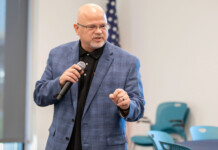
It seems like every flight I take results in an editorial. Maybe it’s because I’m not much of a Solitaire player, and writing can be therapeutic for me. Maybe it’s because flying Southwest is such a great experience (see Southwest flight yields lessons for business, life), and that doing business with US Airways necessitates my need for therapy. Ironically, a contributing factor this time around was a book review I read in the US Airways magazine: Emily Yellin’s Your Call Is (Not That) Important to Us: Customer Service and What it Reveals About Our World and Our Lives.
Last week I logged on to USAirways.com to purchase two frequent flyer tickets (remember the days when “free” tickets were just that, and didn’t come with $105 in fees?) for a last-minute trip back to Indianapolis for a family emergency. I was unable to use my US Airways Dividend Miles MasterCard, which would have given me a discount of 10,000 miles between the tickets.
I attempted to reach my credit card company that evening to find out why my card was not processing, and I got an automated message with the lone option of leaving a voicemail, which I attempted to do; but, wouldn’t you know, the mailbox was full and not accepting messages at that time. (Sure glad I wasn’t trying to reach them to cancel my stolen credit card.) And here begins many lessons on how not to treat your customers.
After logging onto my bank account the following day and seeing that I had not paid my bill that was due a week earlier, I spoke with a representative from the credit card company who confirmed that that was the reason my account was suspended. I was shocked to learn that – in addition to the expected late fee and finance charges – that they suspended my account. I asked if they did this to all their customers or if I was special, and she said the dreaded “P” word – “it’s our policy.” This was after she confirmed that I’d never before been late on a payment since I opened the account in 2002.
This wasn’t the first time in my life I had a bill bury itself on my desk and not get paid on time, but I’d never had my electricity turned off, car repossessed or house foreclosed on because I was a week late paying my bill.
When I informed the rep that I had subsequently sent payment electronically, she gleefully informed me that they would reactivate my account within 3-5 days of receiving the payment, as if that would resolve my issue and make me feel great about doing business with them. Citing my good payment history and that payment in full was en route, subtly informing her that waiting a week to use my credit card wouldn’t work for me, I asked her to reactivate it immediately, a request she denied due to, you guessed it, “company policy.”
I asked to speak with a supervisor who, recognizing my growing frustration, reactivated the card on the spot. (It’s too bad you cannot get anything accomplished with these folks by being polite and patient.)
Now more committed than ever to give US Airways an opportunity to show they value me as a customer, even at the expense of my blood pressure and productivity, I called the frequent flyer folks to see if they wanted to credit back the 10,000 in bonus miles I missed due to my (in my opinion, wrongful) inability to use my FlightFund credit card.
I immediately – and politely – asked to speak with a supervisor, knowing I’d end up there anyway. The rep gave me this song and dance about needing to know about my issue to know which supervisor to send me to; I knew it was a trick but reluctantly played along nonetheless. I gave the rep an overview, and he asked for more detail. Blood beginning to boil, I did what he asked. When he had more than enough information and asked for more still, I demanded the game stop and that he transfer me to a supervisor.
I was transferred, but it may have been to the flunkie in the next cubicle, not to a supervisor. And when I heard the “company policy” line come out of this gal’s mouth for the third time, I requested to speak with the supervisor’s supervisor. Though she initially insisted she was at the top of the totem pole, I convinced the woman with broken English that she did, in fact, have a boss. I was subsequently transferred to someone who claimed to be a “manager.”
The “manager” not only cited “company policy” as justification for not wanting to make any effort to retain me, a loyal customer since 1993, but her English was worse than the previous person’s. I requested I be transferred to a manager in America, and she said she could only transfer me back to the main customer service number, and that there was a 90 percent chance I’d be connected with someone in Manila again.
So, I called the corporate headquarters in Tempe and asked the receptionist to transfer me to a manager who oversaw the frequent flier department. I gave the whole story to the gal who answered the line, and then she told me there’s nothing she could do, and that I’d have to contact the customer service department (mind you, that’s what I’d been trying to do for an hour).
She’d be happy to give me a fax number for them. (Just what I wanted to do, waste more time writing these people who have yet to give me any indication they care that I exist.) She alleged that she didn’t even have their phone number, and apparently did me a huge favor by giving me their email address ([email protected]) instead, assuring me that they are very responsive and would likely respond to me in 3-5 days (turns out we have different definitions of “very responsive”).
So I send a brief, direct and polite (when will I learn?) email imploring them to call me if they care at all about retaining me as a customer. (I never asked for the moon and the stars; a pack of Oreos on my next flight – or even an apology – would suffice.) It’s been eight days, and I’m still waiting.
As frustrating it is to talk to human beings who cannot act like human beings because they are instructed only to say what their computer monitor tells them, I am somewhat empathetic. The banks, phone companies, airlines and other huge companies must have well defined processes in place to ensure their $8-an-hour call center employees – or $8-a-day depending on from what part of the world they are taking your call – don’t acquiesce to every yahoo like me calling to complain about something. But to do everything except call the CEO’s office and never be able to speak with someone who can use their own brain to make a decision about how – and whether – to help a customer, is inexcusable.
It wouldn’t surprise me if one day we read about the commercial airliners being dubbed “too big to fail” like the automakers and banks, followed by the announcement of a financial bailout by the federal government. In the meantime, if our hometown airline is any indication, I think they’re just too big to care.
File photo









![City gave new manager big low-interest home loan City Manager Ben Bitter speaks during a Chamber of Commerce event at Global Water Resources on April 11, 2024. Bitter discussed the current state of economic development in Maricopa, as well as hinting at lowering property tax rates again. [Monica D. Spencer]](https://www.inmaricopa.com/wp-content/uploads/2024/04/spencer-041124-ben-bitter-chamber-property-taxes-web-218x150.jpg)





